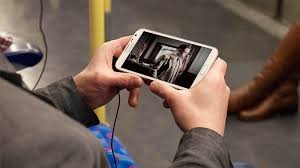 Seoul, Nov 2: You could soon watch 3D videos on your smartphone without any special eyewear, thanks to scientists who have developed a way to make displays for small screen devices that offer both 2D and 3D imaging.
Seoul, Nov 2: You could soon watch 3D videos on your smartphone without any special eyewear, thanks to scientists who have developed a way to make displays for small screen devices that offer both 2D and 3D imaging.
For eyewear-free displays, the only action is behind the screen where the image's pixels and optics are layered together to produce the stereoscopic effect.
The two primary ways of producing these optically illusive effects are by using either an array of micro-lenses, called lenticular lenses, or an array of micro-filters, called parallax barriers, in front of the image to make its appearance depend on the angle at which it is being seen.
The simplest example of this effect is found on a movie poster whose image appears to change as you walk by.
Two or more images are interlaced and printed behind a plastic layer with grooves matching the interlaced pattern.
The grooves act as distinct, interlaced arrays of lenses or filters, unveiling one image as you approach the poster and another as you depart.
In the case of 2D/3D convertible screens, these layers are active, meaning they can be switched on or off.
The gap distance between the image layer and the barrier layer is a key determinant of the viewing distance. Closer stacking of these layers together allows for a closer viewing distance.
Sin-Doo Lee, professor at Seoul National University in South Korea, and colleagues developed a monolithic structure that effectively combines the active parallax barrier, a polarising sheet and an image layer into a single panel.
Instead of two separate image and barrier panels, they use a polarising interlayer with the image layer in direct contact with one side of the interlayer, while the active parallax barrier of a liquid crystal layer is formed on the other side as an array of periodically patterned indium-tin-oxide (ITO) electrodes.
The use of this interlayer allows the minimum separation of the image and barrier layers, thus providing the short viewing distance required for the smaller screens of mobile devices.
"The polarising interlayer approach here will allow high resolution together with design flexibility of the displays, and will be applicable for fabricating other types of displays such as viewing-angle switchable devices," Lee said.
"Our technology will definitely benefit display companies in manufacturing low cost and light weight 2D/3D convertible displays for mobile applications. Under mobile environments, the weight is one of the important factors," Lee added.
This concept not only applies to LC-based 2D/3D displays, but also to OLED-based 2D/3D displays, offering application to a broad range of present and future device designs.
The research appears in the journal Optics Express.





Comments
Add new comment